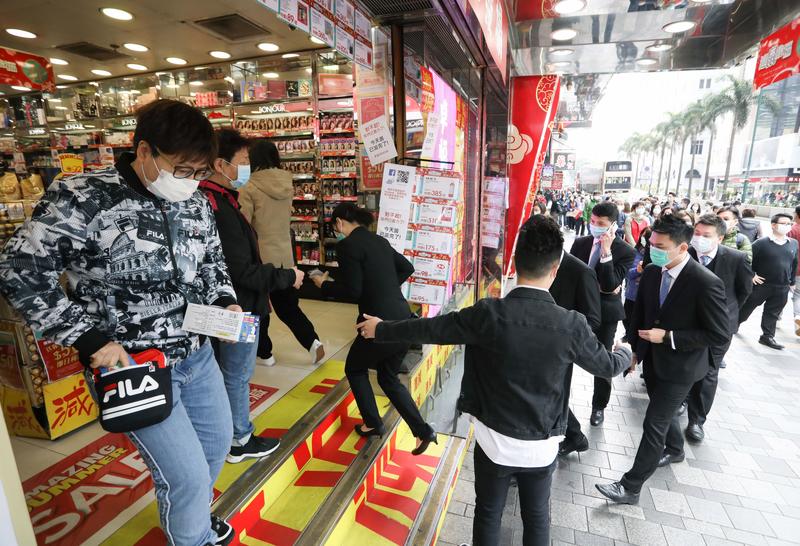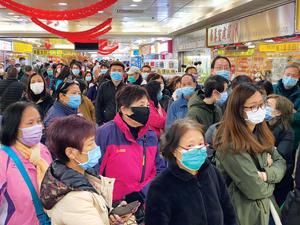 Residents line up to buy face coverings on Feb 12 in Tsim Sha Tsui amid a shortage of supplies in the city. (CALVIN NG / CHINA DAILY)
Residents line up to buy face coverings on Feb 12 in Tsim Sha Tsui amid a shortage of supplies in the city. (CALVIN NG / CHINA DAILY)
Susan Ma has become a face-mask expert. “Walking on the street, I can easily tell the types and protective effect of facial masks pedestrians wear, how much they cost and where you can expect to buy them,” said Ma, bragging about her ability obtained from the current acute shortage of facial coverings in Hong Kong.
Well before the Lunar New Year holiday, the 33-year-old, with self-claimed foresight, had stocked up dozens of N95 respirators and hundreds of disposable surgical masks amid the city’s growing coronavirus alarm.
When she was back in town a few days later, the demand for masks had surged as fears over the deadly disease grew, triggering citywide panic buying of facial coverings among residents who emptied the shelves of retail chains and pharmacies.
All of a sudden, the face mask has become the most sought-after and hardest-to-get commodity in Hong Kong
Susan Ma, Hong Kong resident
“All of a sudden, the face mask has become the most sought-after and hardest-to-get commodity in Hong Kong. The most frequently asked question on the lips of almost everyone is how to get a hold of the protective gear,” said Ma.
Her life soon began to revolve around it. She joined thousands of people lining up outside shops hoping to snap up the facial coverings, but leaving empty-handed after waiting in line for hours. She also tried her luck online, only to be told the newly arrived masks had sold out in the blink of an eye.
Weeks ago, Ma used to have a long list of criteria to pick up surgical masks. Now she can settle for any brand and has no issue with any price. After all, globally, it’s a seller’s market for these items.
Her stockpile is now a “hodgepodge” — ranging from surgical masks for child use, South Korea-made KF94 and facial coverings produced in Vietnam, Indonesia, and as far as Turkey, to masks whose packages offer no information about the place of origin and even those that fail to meet the standards for guarding against bacteria. Each of them costs from HK$5 (64 US cents) to as much as HK$30.
As the novel coronavirus rampages across China and the globe, the world is burning through surgical masks. China, which accounts for about half of the global mask production, is estimated to consume 50 million to 60 million units on a daily basis during the outbreak.
The world’s second-largest economy was initially scrambling to snap excess supply from overseas but is now relying on its own production capacity — reported to be more than 70 million pieces per day — to meet the huge domestic demand.
 People wearing surgical masks flock inside a mall in Tai Po district to purchase masks and hand sanitizers on Jan 29. (EDMOND TAND / CHINA DAILY)
People wearing surgical masks flock inside a mall in Tai Po district to purchase masks and hand sanitizers on Jan 29. (EDMOND TAND / CHINA DAILY)
For a city of more than 7.5 million people with a small manufacturing sector, there’s barely any home-grown brand for facial masks in Hong Kong. When the inventory is exhausted, a chronic shortage of masks is inevitable.
At the end of January, Chief Executive Carrie Lam Cheng Yuet-ngor had written to the State Council asking for help to maintain the supply of masks in Hong Kong. But as the shortage of masks has become a global issue, it turns out to be an issue that must be largely solved by the city itself.
Hong Kong’s business community, including property developer New World Development and HKTVmall — an online shopping platform of Hong Kong Television Network — lost no time in setting up their own production lines for facial masks, with some placing high hopes on the opportunity to bring the “Made in Hong Kong” brand back to glory.
“The major obstacle to local mask production is the cost. This is an enterprise that cannot go without government support,” said Dennis Ng Wang-pun, president of the Chinese Manufacturers’ Association of Hong Kong.
The SAR government has unveiled a HK$30 billion relief fund to help alleviate the burden on the public amid the coronavirus crisis, of which up to HK$1.5 billion will be allocated to a subsidy program for local mask production.
However, Secretary for Commerce and Economic Development Edward Yau Tang-wah told lawmakers earlier that none of the nearly 400 applicants the Hong Kong Productivity Council had talked to could meet the government’s technical standards. Compared with the funding support, some local suppliers also said they care more about how to find an affordable site to get a production line started.
Charles Ma, a Hong Kong-based consultant at one of the “Big Four” accounting firms, believed that local mask production, albeit not a lucrative operation, is a must-do enterprise.
“It may be too early to say that local mask production will get the ‘Made in Hong Kong’ brand off the ground. But, it’s far more necessary to build up our own mask manufacturing capacity. This is, perhaps, one of the sobering lessons we can learn from the coronavirus outbreak,” he said.


